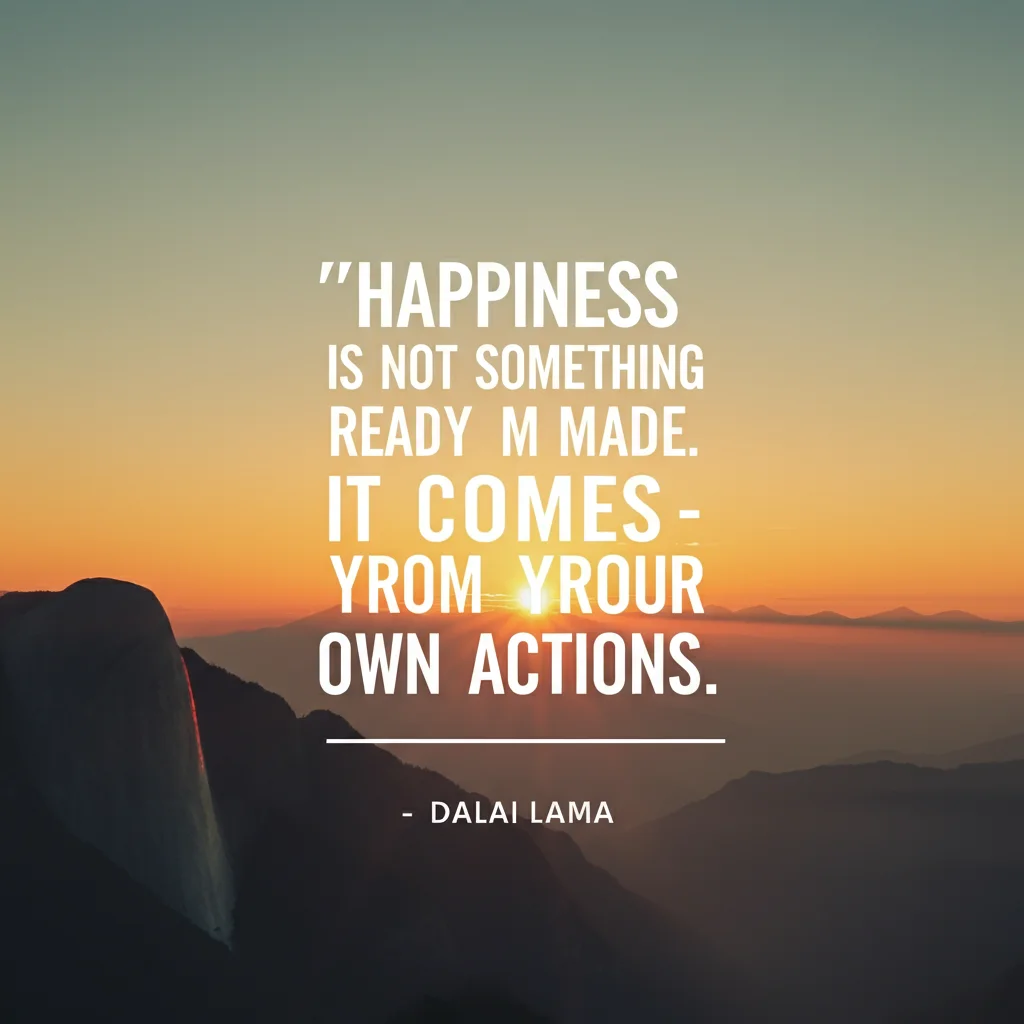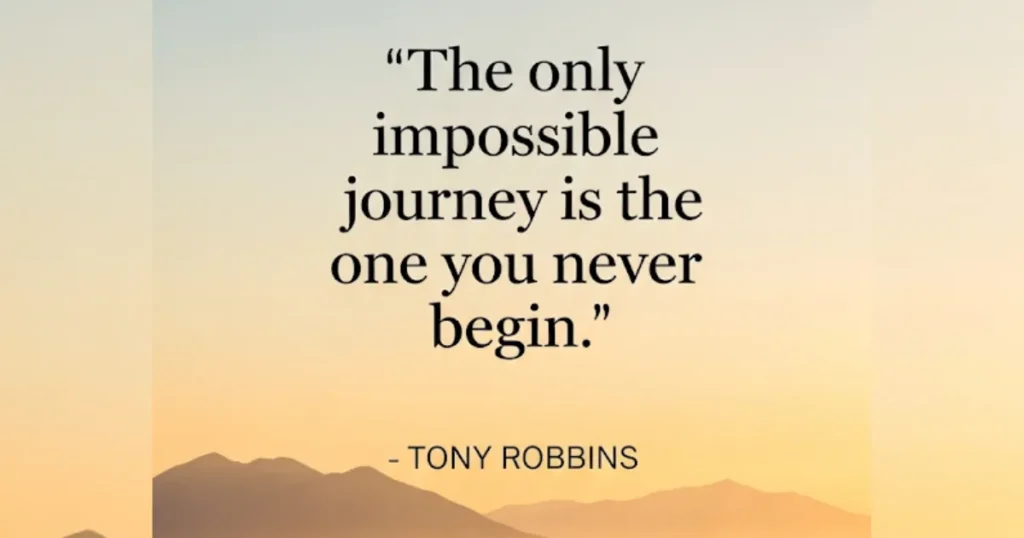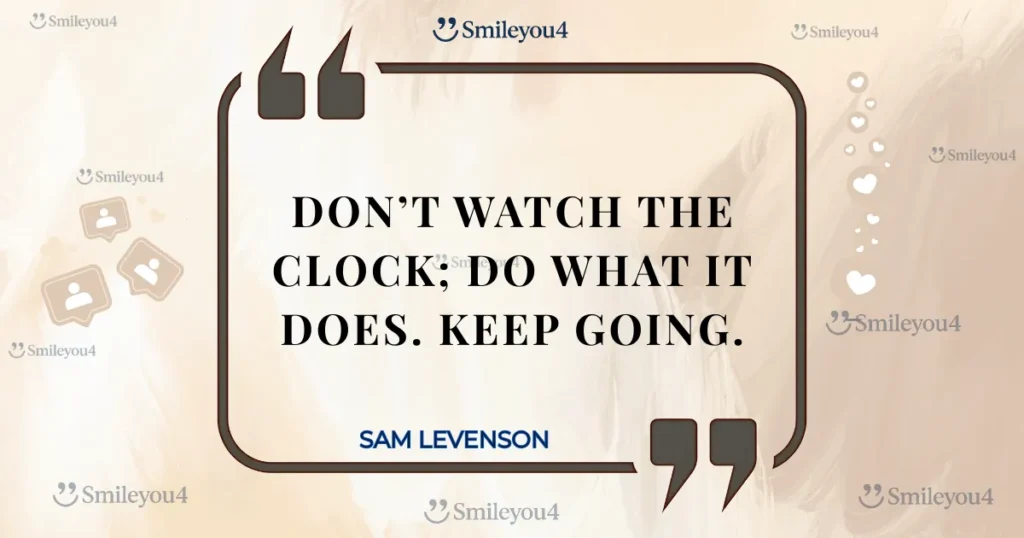We live in an age where happiness feels like something we’re constantly chasing — scrolling through social media for the perfect life hack, buying products that promise instant joy, or waiting for that next big breakthrough to finally feel fulfilled. Yet one of the world’s most respected spiritual leaders offers a radically different perspective: “Happiness is not something ready made. It comes from your own actions.”

The Dalai Lama, born Tenzin Gyatso, has spent decades studying the nature of human contentment. As the spiritual leader of Tibetan Buddhism and a Nobel Peace Prize winner, his insights on happiness aren’t just philosophical musings — they’re battle-tested wisdom from someone who has maintained joy despite facing exile, loss, and immense challenges.
This profound quote challenges everything our consumer culture teaches us about happiness. Instead of positioning joy as something external to acquire, it places the power squarely in our hands. In a world where daily inspiration often feels fleeting and happiness quotes can seem superficial, this message offers something deeper: a blueprint for sustainable contentment.
At its core, this quote demolishes the myth that happiness is a destination. Think about it — how often do we tell ourselves “I’ll be happy when…” followed by some future achievement, purchase, or life change? The Dalai Lama’s wisdom cuts through this illusion with surgical precision.
“Not something ready made” means happiness isn’t sitting on a shelf waiting for us to find it. It’s not a gift the universe owes us, nor is it something we can simply stumble upon. This challenges our instant-gratification mindset where we expect everything to be immediately available.
The second part — “It comes from your own actions” — is where the real power lies. Every choice you make, every habit you build, every response you give to life’s challenges contributes to your overall happiness. This isn’t just feel-good philosophy; it’s a practical framework for living.
Consider the difference between someone who waits for happiness to arrive and someone who actively creates it. The waiter remains dependent on external circumstances, forever at the mercy of things beyond their control. The creator, however, understands that happiness is a skill to be developed, like learning to play an instrument or building physical fitness.
This perspective transforms how we view both struggles and successes. Difficult moments become opportunities to practice resilience and gratitude. Good times become chances to savor and appreciate rather than just consume. Every action becomes a building block in the architecture of your joy.
Career Growth Through Intentional Actions
Sarah worked in a soul-crushing job for three years, waiting for the “right opportunity” to feel professionally fulfilled. After encountering this quote, she realized happiness wouldn’t magically appear with a new job title. Instead, she began taking small actions: volunteering for projects she enjoyed, learning new skills during lunch breaks, and connecting with colleagues who inspired her.
These actions didn’t just make her current job more bearable — they prepared her for the career change she eventually made. When she finally transitioned to a role she loved, she discovered that the happiness didn’t come from the new position alone. It came from the intentional actions she had been taking all along to grow and contribute meaningfully.
Personal Growth Through Daily Choices
Marcus struggled with low self-esteem and constantly compared himself to others on social media. He thought happiness would come when he looked like the fitness influencers he followed or achieved their level of success. Instead of waiting, he began focusing on actions within his control.
He started with five minutes of morning journaling, expressing gratitude for three things daily. He began taking evening walks, not to reach a fitness goal, but to clear his mind and appreciate his neighborhood. He limited social media to 30 minutes daily, using the extra time to read books that genuinely interested him.
These weren’t dramatic changes, but they were consistent actions aligned with his values. Over six months, Marcus noticed his baseline happiness had shifted. He still faced challenges, but his foundation of joy was no longer dependent on external validation.
Relationship Building Through Mindful Connection
Lisa felt lonely despite being surrounded by people. She kept waiting to meet her “perfect” friend group or romantic partner, believing the right people would automatically bring happiness to her life. This quote helped her realize that meaningful relationships require intentional cultivation.
She began taking action: really listening when friends spoke instead of planning her next response, sending thoughtful messages to people she cared about, and organizing small gatherings instead of waiting to be invited to events. She practiced vulnerability by sharing her genuine thoughts and feelings rather than just surface-level pleasantries.
These actions transformed her existing relationships and attracted new connections aligned with her authentic self. The happiness didn’t come from finding perfect people — it came from her consistent actions to be a better friend and partner.
In our hyperconnected world, this ancient wisdom feels more relevant than ever. We’re constantly bombarded with messages that happiness is just one purchase, one achievement, or one life change away. Motivational quotes flood our feeds, but they often promote the same myth — that happiness is something external to be acquired rather than internal to be cultivated.
Social media amplifies this illusion by showcasing highlight reels that make it seem like others have found the secret to effortless joy. We see perfectly curated moments and assume they represent constant happiness, forgetting that behind every post is a real person taking intentional actions to create meaningful moments worth sharing.
The rise of anxiety and depression, particularly among younger generations, can partly be attributed to this happiness-as-destination mindset. When we believe joy should be readily available and we don’t feel it, we assume something is wrong with us. The Dalai Lama’s perspective offers relief: happiness isn’t supposed to be constant or effortless. It’s the natural result of consistent, intentional actions.
Modern neuroscience supports this wisdom. Research shows that our brains are remarkably plastic, capable of forming new neural pathways based on our repeated actions and thoughts. When we consistently choose gratitude over complaint, connection over isolation, or growth over stagnation, we literally rewire our brains for greater happiness.
This quote also addresses our culture’s addiction to external validation. Instead of building happiness on the shaky foundation of likes, comments, and approval from others, it encourages us to focus on actions that align with our values regardless of external recognition. This creates a more stable and sustainable source of contentment.
The wisdom applies to our relationship with technology too. Instead of passively consuming content and waiting for entertainment to make us happy, we can choose to create, contribute, and connect in ways that build lasting joy. The action of reaching out to a friend will always bring more happiness than scrolling through their photos.
The Dalai Lama’s wisdom reveals a liberating truth: you don’t need to wait for happiness to find you. You don’t need perfect circumstances, unlimited resources, or a complete life overhaul. You simply need to start taking actions aligned with joy, connection, growth, and meaning.
This perspective transforms you from a happiness consumer to a happiness creator. Instead of being at the mercy of external circumstances, you become the architect of your own contentment. Every small choice becomes an opportunity to build the life you want to experience.
The beauty of this approach is its immediacy. You can begin creating happiness right now, regardless of your current situation. Whether you’re facing significant challenges or riding high on success, the principle remains the same: your actions today are building tomorrow’s joy.
Remember, this isn’t about toxic positivity or pretending everything is perfect. It’s about recognizing that within any circumstance, you have the power to take actions that align with your values and contribute to your overall well-being.
Inspirational quotes like this one aren’t just pretty words to share on social media — they’re invitations to examine how we’re living and adjust our approach. When we truly understand that happiness comes from our actions, we stop waiting for life to happen to us and start actively creating the life we want.
The path to sustainable happiness isn’t found in any external achievement or acquisition. It’s built one intentional action at a time, one conscious choice at a moment, one day at a time.
So here’s your moment of reflection: How can you apply this wisdom today in your life? What’s one small action you can take right now that aligns with your values and contributes to your happiness? Don’t wait for the perfect moment or the ideal circumstances. Your happiness journey begins with whatever step you choose to take today.


